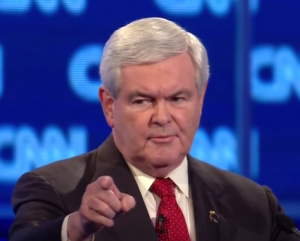America Has Been Looking for a Politician Who Will Fight Back
 English has become sanitized in recent decades. People say what sounds good, not what they really think, as if a recording device has been hidden for later use in the courtroom.
English has become sanitized in recent decades. People say what sounds good, not what they really think, as if a recording device has been hidden for later use in the courtroom.
Police officers on the beat are instructed to respond unnaturally to the vicious insults of petty criminals, always maintaining what appears to be maximum composure, emotionless logic, and matter-of-fact posturing. Certainly the officer shouldn’t match the out-of-control behavior of some hoodlum, but is it appropriate to come across as a robot?
You see the same icy polish in generals being interviewed on television, and we long to hear from commanders who are capable of human passion. Do we respond more to a cerebral computer or to a George Patton?
The middle class continues to follow the norm of maximum restraint, which at first seems solid evidence of poise, but soon comes across as craven self-protection. But in military circles, apparent weakness invites aggression. The same thing happens when liberals find that they can be as nasty as they want to with polite conservatives. Bullies in schools are similarly emboldened.
Political debate has followed the same formula. The elder George Bush talked urbanely about “taking off the gloves.” In the earlier debates, Michele Bachmann stood patiently by while other candidates got all the attention. New Jersey’s Chris Christie comes across as a potential fighter, but probably owing more to his bulk and association with characters in the Sopranos soap series.
Sure, Romney challenged the liberal attack by questioner George Stephanopolaus in an earlier debate, but Americans want to see more of this. Maine’s governor Paul LePage seems capable of the same tough talk that made Reagan so popular, though neither would lapse into the tantrums of a Nikita Khrushchev.
Television broadcast media has long established itself as a bulwark of extreme liberalism, complete with double standards and selective attention to what’s newsworthy. John Hayward, writing about “The Final South Carolina Debate,” says that “It almost makes you forget that the same media organizations closed ranks like a Praetorian guard around Bill Clinton’s marital infidelities, and more recently struggled with all their might to ignore Anthony Weiner for as long as possible. Remember when old indiscretions were considered dusty rubbish, and anyone who focused on the character of a presidential candidate was a Bible-thumping humorless prude? Now they’re big-money news extravaganzas that get cross-promoted by other networks!”
Newt Gingrinch’s response to John King was a model of impassioned outrage. Gingrich was always in control and composed, but not with a plastic smile on his face and pretending to a false equilibrium or calmness.
The socialist leaders of Germany and Italy during World War II knew well that their rise to power depended on mixing it up once in a while, deploying ruffians when they knew that opposition would quail. Nor should Christians turn the other cheek when intimidated.
The message is clear to American conservatives that there has to be more confrontation to counter liberal hostility, however moderate overall. This is true in political sectors but also in everyday human interactions. Silence breeds contempt. Diplomacy and appeasement do not always yield satisfactory results.
 English has become sanitized in recent decades. People say what sounds good, not what they really think, as if a recording device has been hidden for later use in the courtroom.
English has become sanitized in recent decades. People say what sounds good, not what they really think, as if a recording device has been hidden for later use in the courtroom.